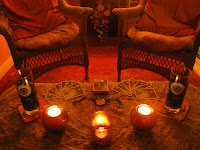
When it’s nearly midnight and at last you’re asked to dance,
Will you step into the arms of a prince or a dunce?
Do you seize the moment, will it only come once?
These are the dilemmas of Time and Chance.
Call it Kismet, call it Karma, call it Destiny or Fate,
Just be careful when you go out waltzing on a date -
That man of your dreams may be a nightmare full of hate -
So don’t turn up too early, but oh, don’t arrive too late.
So is it to be carpe diem or que sera sera?
Were you born under a lucky or an unlucky star?
Will you amount to nothing or will you go far?
If you miss the last boat, will you thumb down a car?
They say Time’s a healer, it will lead you by the hand
To follow the footprints leading away in the sand.
They say grief will pass when you reach that other land
Where life goes on and you must finally make a stand.
Now those vows you made for better or for worse,
Will they deliver the blessing or do they bring the curse?
But Chance is the dealer and you may win or you may lose -
Are the aces played low or high - which of them will you choose?
And it is said that what goes around will come around
And for everything lost something else will be found,
But listen to that sound, that awful, grinding sound -
Can that be the Wheel of Fortune breaking down?
Now you see you’re caught between a hard place and a rock
And the hands are a blur on the face of the clock.
Is there still enough time to reflect and take stock?
You find the key, but no guarantee and there may not be a lock.
Back at the ball, see the mysterious masquerader advance;
That swirling of his magical cloak is meant to entrance.
Will this be your very last appointment with romance?
These are the dilemmas of Time and Chance.
(2011)
Started a while back but only licked into shape now. It’s really just an exercise in compressed rhyme and having a little spooky fun with the basic idea of coincidence.





